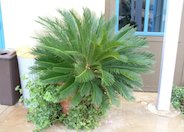
Common name:Sago-Palm
Botanical name:Cycas revoluta
Sago Palm resembles small palms; it is evergreen. It can slowly grow to 10'. It is used for a tropical effect and also looks great in planters. In the low desert, light shade and additional moisture are best. Side sprouts can form multi-trunked individuals. Apply fertilizer at leaf expansion. This plant has few pests.
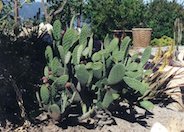
Common name:Mission Fig
Botanical name:Opuntia ficus-indica
This Opuntia is more tree-like than other types; it grows to15' tall. It usually has no spines but some glochids can be found. Flowers are yellow to orange in late spring and early summer. Fruit is edible. It does best in full sun and is frost sensitive. It needs well drained soil. The major pest and source of the red dye cochineal comes from a scale.
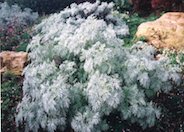
Common name:Silver Mound Artemisia
Botanical name:Artemisia schmidtiana 'Silver Mound'
This mounding perennial will grow 1'-3' high and has medium-sized silvery white leaves with yellow and white flowers.
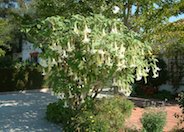
Common name:Angel's Trumpet, Datura
Botanical name:Brugmansia X candida
A tender, subtropical shrub that grows to 12', the Angel's Trumpet shows huge, felty leaves and enormous, pendant trumpet-shaped flowers. It has a sweet, heavy fragrance at night. It should be grown in sun to part shade, with average to little summer watering. The growth rate is faster with fertilizing, but it is more prone to insect damage. This variety seems to recover faster from hard frosts. -Montery Bay Nursery
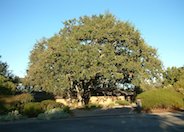
Common name:Coast Live Oak
Botanical name:Quercus agrifolia
The Coast Live Oak is an evergreen round headed tree. It can reach 15'-40' high and 20' wide; it grows very well from the coastal areas to the interior valleys. It is native to California, is drought tolerant, and attracts butterflies. -Cornflower Farms
| Designer: Sunset Staff | LA Arboretum Sunset Section 18 |
Photographer: GardenSoft |
Soils and Compost:
Practice grass-cycling by leaving short grass clippings on lawns after mowing, so that nutrients and organic matter are returned to the soil.
Integrated Pest Management:
Drip and other smart irrigation delivers water directly to roots, allowing no excess water for weeds.
